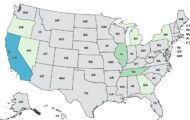A U.S. district court in Illinois has rejected a motion in a lawsuit brought against Quaker Oats. The deceptive advertising case has been brought by a private consumer over label claims on Quaker's Instant Oatmeal, Chewy Granola, and Oatmeal To Go products. All of those products bear the claims "heart healthy" and "wholesome", when they contain trans fats not declared on the label. This speaks directly to the issue Food Poisoning Bulletin has reported on before: that companies are allowed to claim "zero trans fat" as long as the product has less than 0.5 grams of trans fat per serving. However, Daniel Askin, the consumer who brought the lawsuit, claims that Quaker's Granola Bars contain 5.0 grams of trans fat, far more than the label requirement limit. The lawsuit targets the … [Read more...]
Eating Trans Fats Increases Stroke Risk in Older Women
Most of us have heard that trans fats are bad news. Cities and states have enacted regulations limiting their use in restaurants and school lunches. Most food labels show trans fat amounts (to an extent). And new research now shows that consuming trans fats increases stroke risk in older women. The study, conducted by researchers at the University of North Carolina at Chapel Hill, says that women who ate the most trans fat are 39% more likely to have an ischemic stroke than women who ate the least trans fat. Earlier studies concluded that trans fat consumption is linked to increased incidence of heart disease. But other studies have found no link between dietary fat intake and stroke incidence. Until now. This study is larger than the two other studies that showed no link, and the … [Read more...]
CDC Finds Significant Decrease in Trans Fats Levels
The Centers for Disease Control (CDC) announced today that trans fat levels in the blood of white American adults has fallen 58% from 2000 to 2009. Artificial trans fatty acids are made when hydrogen is bubbled through liquid oils. The hydrogen bonds to some of the carbon atoms in the unsaturated fats in a "trans" configuration, which is straight, unlike the "cis" configuration, which is twisted. It turns the unsaturated fatty acids into partially-saturated fatty acids, making the oil a malleable solid that melts when heated. The fat is less likely to become rancid and is much less expensive than butter or lard. In 2006, a review in the New England Journal of Medicine found that every year in the U.S., 30,000 to 100,000 deaths from heart disease were caused by trans fat consumption. … [Read more...]




